
Vol. XXV, No. 9, August 2025
AI romance: a primer and its impact on out-of-home entertainment
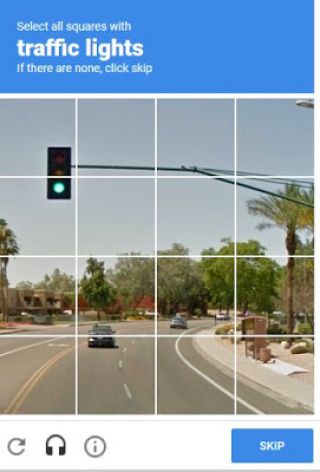
If you are a fan of science fiction, you have probably come across a storyline where a character falls for some sort of artificial intelligence. Blade Runner 2049 (2017) and Companion (2024) are two recent examples. And this year's Oscar-winning Live Action Short, “I am not a robot”, features a woman struggling with one of those annoying CAPTCHA tests where you pick out all the photos with bikes or street signs to prove you are not a robot. Spoiler: it turns out she IS a robot and is just a rich man's AI companion. But like many themes in science fiction, the concept of a romantic relationship with an artificial intelligence is starting to become a reality. No really, there is data to prove it. So today, let's take a look at the futuristic, but very real phenomenon of AI romance and how it will and might already be affecting out of home entertainment.
Cyber romance may seem like an odd subject for a newsletter dedicated to out-of-home entertainment, but consider what it is at its most basic form, a way to fulfill our innate need to socialize. As we discover new outlets for socialization, ones that are as convenient as your phone or computer monitor, this will affect our desire to leave our homes for socialization, including at entertainment venues. This is bad news for an already struggling industry.
According to the American Time Use Survey, time spent at arts and entertainment, which includes LBEs, has dropped by 31% or 58 mins/month over the past decade. When looking at spending at movies, parks, and museums we see a similar story. Inflation-adjusted household spending at movies, parks, and museums, which includes LBE's, has dropped by an average of 13% since 2015. This decrease can be seen across all income levels, with the lowest quintile of household income showing a 51% decrease, while even the highest and second highest quintiles of household income show decreases of 10% and 14% respectively.
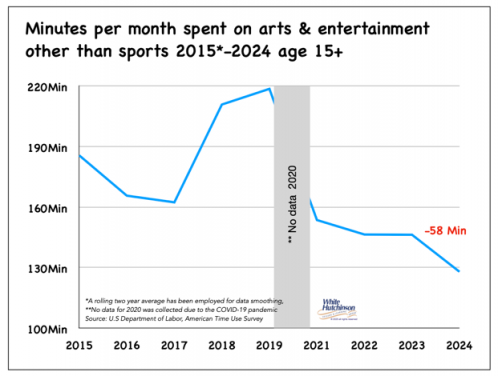
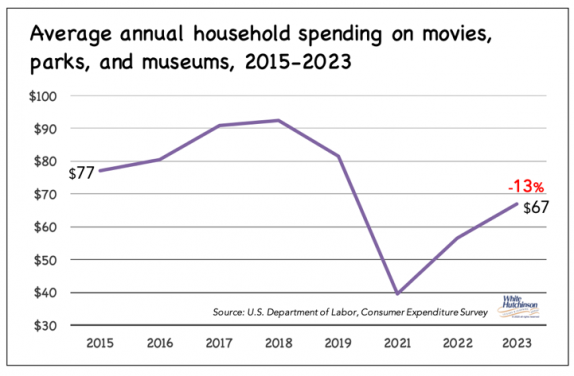
By contrast, the AI companion market is booming. Match's 2025 Singles in America study showed a 333% growth surge in AI use in dating, both chatting with a bot romantically or using AI to help craft a dating profile and send messages. Replika, the leading AI companion app, has over 30 million users worldwide. Character.ai, another leading AI companion app received over 223 million visits in February 2025 alone. Character.ai users spend an average of 17 min and 23 second per visit and a total of approximately 93 minutes per day chatting with their companions. For reference the average time on other ChatGPTs platform is 7 minutes 12 seconds. Character.ai reported an annual revenue of $32.2 million on 2024, up more than 100% from $15.2 million in 2023, and they are projecting a revenue of $50.1 million 2025. A market.us study predicts that the AI companion market could reach $290.8 billion by 2034.
72% of U.S. teens are using Replika, Character AI, and Nomi AI.
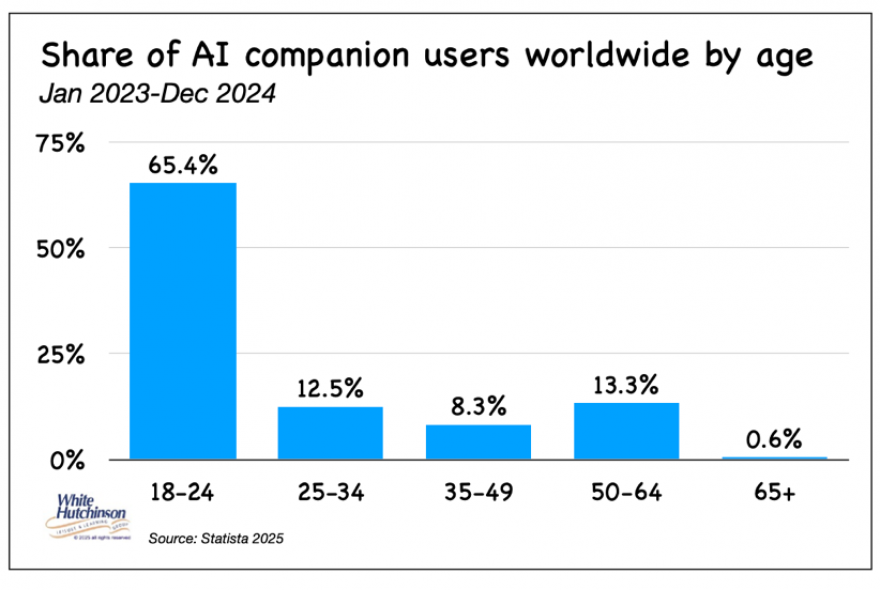
So, AI companions are big business, but what exactly are they? You probably are familiar with programs such as Amazon's Alexa and Apple's Siri, which are considered virtual assistants. Despite their soothing and competent voices, they are mindless drones. They can complete tasks, answer direct questions, and give canned responses but little more. Digital companions on the other hand are programmed using AI to simulate empathy and emotional intelligence and to interact, learn, and grow, developing unique personalities and deepening their relationship with the user over time.
AI companions can interact with individuals in several ways, by text, such as Elon Musk's infamous chatbot Grok, by voice, like a smarter version of Siri or Alexa, or through multiple means, such as video, audio, and images, called multi-modal AI. Although the latter may seem the most futuristic, all types of AI companions can provide their users with a very reasonable facsimile of an interpersonal relationship.
Did you ever wish you could be friends with Anne of Green Gables, Walter White, or Bilbo Baggins? Or pick Julius Caesar's brain on military strategy? An AI companion can make that happen. But more importantly, they can create a fully realized, incredibly realistic friend who will learn your likes and dislikes over time and is literally programmed to like you. And despite all the AI companion can provide, it asks for little in return. You can ignore them when you are busy and rely on them when you are not. They are available 24/7, never sleeping or needing “space”. That is unless you program it that way. This mixture of emotional support without demands in return can be a heady combination for a lonely populace.
And the data shows that people who interact with these AI companions are developing strong emotional and even romantic ties. The average user on Character.ai spent 93 minutes daily talking to chatbots according to a Sept 2024 survey. A Harvard Business School study found over half the users of Replika consider themselves in a romantic relationship with their AI companion. A recent survey by the Institute for Family Studies found that 1 in 4 (25%) of young adults think AI could replace real life romantic relationships. And a recent survey by Joy.AI an AI companion website, found 83% of Gen Zs said they can form a deep emotional bond with an AI companion while a shocking 80% of them said they would be open to marrying an AI companion.
The interest in AI companionship is highest among Gen Z males. According to Statista, over 65% of AI companion app users are aged 18-24. This holds true for romantic companionship as well. Match's survey found 33% of Gen Z have engaged with AI as a romantic companion followed by Millennials at 23%. A survey by Aigirlfriends.ai found 39% of users are 21-24 and 81% are male, with the average user age being 27.4, the older end of Gen Z. Since new technology is almost always initially adopted by the younger generations it would be easy to attribute that to the skew of AI companion use to the Gen Z cohort, especially since they are considered digital natives, but there may be more to it.
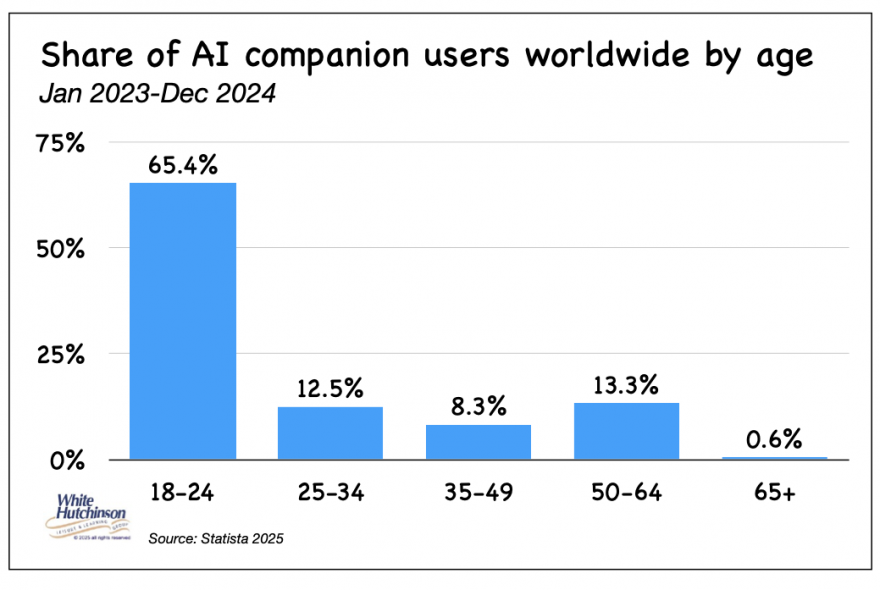
According to a 2020 Harvard Study 61% of young adults 18-24 feel “serious loneliness” compared to 36% of all Americans. A 2022 Cigna survey on loneliness in the US had found 79% of this age cohort to be considered lonely. In fact, Gen Z is being dubbed “the loneliest generation”. Add to this the fact that they have spent their entire lives online, it seems almost inevitable that they would turn to a digital solution to their loneliness problem.
But unfortunately, their quest for a short-term solution to their loneliness may result in just the opposite. Excessive time spent with and relying on AI companions can hinder the development of real-life social skills. AI relationships are one sided, non-threatening and easy. AI companions are infinitely patient, are never in a bad mood and are centered around you, the user. Contrast this with real life relationships which are complicated, messy and require give and take on both sides. By relying on AI to help alleviate feelings of loneliness and to fulfill the need for connection, users may unintentionally find themselves unable to build real life relationships and turning to AI companions even more, creating a vicious feedback loop.
Technology has created another compelling reason to cocoon at home and that technology not only entertains but provides an emotional connection that, at least to its users, seems very real. If the surge in interest in AI romance continues at its predicted pace, the effect on out-of-home entertainment could be significant. AI bot users will no longer need to leave their homes and visit restaurants and LBEs with a real person date. And it would be understandable to view AI companions as another nail in the coffin of the LBE industry.
But we urge you to take a look at it in a different light. We believe the rise in AI companionship reveals just how strong the human desire for companionship, intimacy, and belonging are. We have created a technological wonder in AI and what we use it for? To make ourselves a friend, a romantic partner. No matter how technologically advanced we have become, we still want the same basic thing, to connect, to belong. By tapping into this base desire and making the primary focus of your business facilitating that connection, in your design, in your food and beverage options, in your choice of attractions, you too can benefit from humanities innate need to belong and socialize.
Note: AI was used to help research this article, but we aren't dating. Yet.
Subscribe to monthly Leisure eNewsletter


